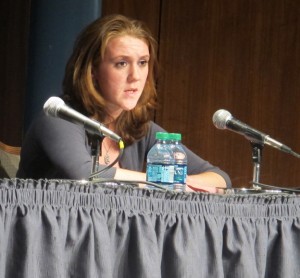Why Higher Student Debt Loads Don't Always Translate Into College Degrees

Kyle Stokes / StateImpact Indiana
Junior Kate Lavery says she's unsure whether she'll be able to finish her sociology degree from IU because of her debt load. It largely hinges on whether her parents are approved for a federal college loan next year.
Last month, we introduced you to Kate Lavery, an Indiana University junior in more than $100,000 in student loan debt. Because of some family financial issues, she’s unsure whether she’ll be able to pay the cost of completing her degree next year.
Kate’s level of debt is exceptional by most standards, but her fear about finishing school despite a high student loan burden is becoming more common, writes The Washington Post:
Nearly 30 percent of college students who took out loans dropped out of school, up from fewer than a quarter of students a decade ago, according to a recent analysis of government data by think tank Education Sector. College dropouts are also among the most likely to default on their loans, falling behind at a rate four times that of graduates.
That is raising new questions about the wisdom of decades of public policy that focused on increasing access to higher learning but paid less attention to what happens once students arrive on campus. And some education experts have begun to argue that starting college — and going into debt to pay for it — without a clear plan for a diploma is a recipe for disaster.
“They have the economic burden of the debt but they do not get the benefit of higher income and higher levels of employment that one gets with a college degree,” said Jack Remondi, chief operating officer at Sallie Mae, the nation’s largest private student lender. “Access and success are not linking up”…
The plight of “non-completers” has grown in magnitude as student debt tops $1 trillion, according to the Consumer Financial Protection Bureau. In addition, the sputtering economy has forced a growing number of students to make difficult choices between the benefits of a degree and the burden of paying for it. More students are balancing their studies with full- or part-time jobs or signing up for a reduced course load to save money, increasing the likelihood that they will not graduate.
College officials in Indiana say they’re trying actively to push students to make better academic and financial decisions once they start college. IU Treasurer MaryFrances McCourt says university administrators are trying to find ways to link grades to financial aid counseling. She adds, though, that while she sees the potentially-crippling effects of student debt, she doesn’t believe the higher education system is in “crisis mode” just yet.
—Dewayne Matthews, Lumina Foundation
As Nick Hillman, a professor of higher education policy at the University of Utah, told StateImpact last month:
We’ve moved away from a system of grants to one of loans and tax credits. This is a demonstration of our policy values where we want to put more of the responsibility on the individual students, so taking out debt is becoming an expected thing to do.
It might not be a bad thing. Taking out debt to pay for a portion of school might not necessarily be a bad public policy option, it might actually help a lot of people enroll in college. But it’s when that debt burden hits that tipping point where it becomes unmanagable, it becomes burdensome, it becomes inequitable for certain borrowers, then you start to have a problem. That’s what we’re starting to see.
On a recent post about the potential bubble in student lending, commenter ‘CommonSense17761776’ says (s)he believes in the value of a college education — but:
The problem is the way the masses are getting that education…by borrowing non-dischargeable debt that NEVER goes away. It cannot be refinanced, truth in lending requirements are not present, and the debt grows when that person is not able to make the payments. Additionally, these people need jobs that support their education. The lack of jobs is also part of the real problem. Even if education was free in this country, you still would have too many educated people pissed off because they are unemployed.
What do you think of CommonSense17761776’s comments? Or The WaPo write-up on student debt? Let us know in our comments section — it’s always open!
